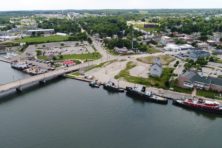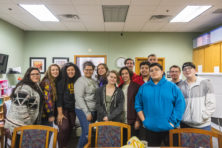County Stakeholders Fight for Change in Madison
- Share
- Tweet
- Pin
- Share
r>Water was the keystone agenda item at Legislative Days and delegates felt their efforts were mostly successful. The day consisted of meeting with individual legislators and presentations to a panel of Wisconsin’s agencies.
“If you could do one thing while you’re down here,” said Representative Joel Kitchens to the group, “please impress on our legislators how important this relationship that we have with water is. We will forever be trying to find the proper balance between the economic development of our shoreline and preserving the natural beauty. But I think we can all agree on one thing – we need to protect our water.”
Water-related issues on the agenda included agriculture standards to protect groundwater contamination, securing funding for beach testing, improving the Kewaunee Harbor seawall and restoring the Harbor Assistance Program.
“There’s no district in the state that has a greater abundance of water but there’s also none that has a greater dependence on it. It drives our manufacturing, our agriculture, it certainly drives our tourism,” said Kitchens.
In the morning, county representatives for each agenda item presented to a panel of state agencies. After a luncheon with Representative Kitchens, delegates split into groups of five to talk to individual legislators at pre-arranged meetings.
Delegates met with assemblymen, senators and aides to representatives. Kitchens warned that many representatives were wrapped up in budget concerns and had less time for visitors.
Still, delegates met with up to four representatives to pitch their agenda items and hope for a positive reception from the lawmakers.
State Assistance for Preventing Groundwater Contamination
Conservationists called for legislators to create geo-regions throughout the state, allowing local governments to enforce groundwater standards based on their specific geology. Legislators were receptive on the grounds of keeping water clean and clear. But most representatives sought a draft of legislation that would get the ball moving.
Door County Conservationist Greg Coulthurst felt this item could gain momentum in allowing each part of the state to address the issue as they needed to. It is not an issue exclusive to northeast Wisconsin.
Representative Todd Novak warned that, “when you section off different parts of the state, you get pushback from different groups.”
Still, Coulthurst had positive conversations with Representatives Jim Ott, Jeff Mursau and Scott Krug, who had been following the issue for the past three years.
Coulthurst was disappointed in the lack of receptiveness from the Department of Natural Resources (DNR), but trusts that better science will bring greater attention from the department.
Establish Steady Funding for Beach Water Testing
Kitchens explained that closed beaches and contaminated water are as poisonous to the economy of Door and Kewaunee counties as they are to its citizens. Delegates hoped to get a secure funding source to ensure continued testing of beach water and posting for beaches that are closed to swimmers.
Delegate Sam Perlman from the Door County Economic Development Corporation told legislators that, with the viral nature of social media, visitors that fall ill due to beach contamination would create a “public relations nightmare” for the area.
DNR Secretary Cathy Stepp advised county public health officials to seek avenues of funding such as grants for recreational use. The panel also discussed the idea of county and municipal money contributing to the testing fund, as seen in cities such as Milwaukee and Racine.
Restoration of the Kewaunee Harbor Seawall
Kewaunee delegates advocated for $4.2 million to be provided in restoring the Kewaunee Harbor seawall that has fallen into disrepair. Representatives that know Kitchens have heard him promote the seawall, with Representative Novak calling it “Kitchen’s baby.”
“I am cautiously optimistic that we will get the Kewaunee harbor project done,” said Kitchens.
This idea was echoed among other legislators who stated there will most likely be room in the budget for the restoration.
Restoration of Harbor Assistance Program Funding
The Harbor Assistance Program, which Sturgeon Bay hopes to use to improve its waterfront redevelopment and Bay Shipbuilding has used to develop its harbor, lost $11.6 million in bonding authority. Roughly $1 million is available to cover more than $10 million in pending grants from six commercial harbors around Wisconsin.
“The thing I don’t like with these competitive grants, is that guys like you get pushed out of the bigger competition,” said Representative Novak about Sturgeon Bay competing with harbors such as Sheboygan, Green Bay and La Crosse.
Sherri Walz, program manager of the Harbors and Waterways division of the Department of Transportation (DOT), explained that $3.7 million was made available from a returned grant but they did not expect any more funding to be made available. Walz also suggested to Sturgeon Bay Mayor Thad Birmingham to apply for grants from the DNR to develop the waterfront district. The waterfront redevelopment calls for recreation areas that are eligible for grants from the DNR.
The DOT will announce which commercial ports will receive grant funding within the next three weeks.
Support the Knowles-Nelson Stewardship Program
Legislators are already at work lifting the freeze on the Knowles-Nelson Stewardship Program proposed by Governor Scott Walker.
“Freezing it is just going to kill it and we can’t have that,” said Representative Novak. Novak and 10 other Republican representatives signed a letter addressed to Assembly Speaker Robin Vos calling for the program to continue.
“We believe that Governor Walker’s budget proposal to halt purchases from the Knowles-Nelson Stewardship program is the wrong policy for Wisconsin,” the letter stated. “Not only is protecting our environment the right thing to do, it is also vital to our economy… People flock to our state to enjoy our pristine waterways and hike our beautiful forests.”
Technology Needs for Public Schools
High property values in Door County are interpreted by the state as having equally high income levels. The state does not fund these districts as much despite the fact that the property values do not equate to an ability to pay. Door County is property rich, but income poor.
Southern Door Superintendent Patti Vickman received support from state agencies in her presentation about fair funding.
“[Assistant State Superintendent] Kurt Kiefer said that our presentation was spot-on as to the direction that is needed for our schools and the opportunities needed for student learning to ensure that they are college- and career-ready,” said Vickman.
The proposed budget cuts would result in reduced funds of nearly a half million in both Door and Kewaunee schools.
“Legislators or their staffers indicated that they had heard lots of concern from the general public, educators, and parents that the cuts being made to public K-12 and the university system were going to set the state back on its goal,” said Vickman.
Winery Regulatory Reform
In its second time on the Legislative Days agenda, legislators agreed with the winery reform, calling for an equal definition of a small winery and small brewery. Representative Romaine Quinn believes the reform makes “complete sense.” Yet the beer distributor lobby is a strong force in Wisconsin.
“It would be nice if everyone would get together in a room outside of here and come to a decision they could bring to us,” said Rep. Novak.
“We are not asking for any money or a handout. We are only asking for fairness,” said Tim Lawrie, founder of Simon Creek Winery.
Delegates were not confident that, despite the logic of the reform, legislators have enough time during budget season to pursue the change among other agenda items.


